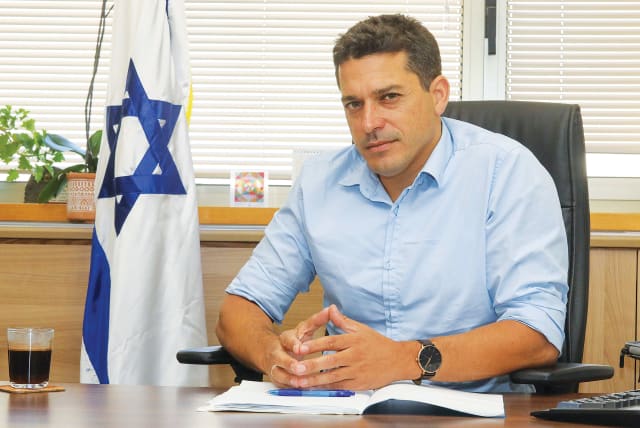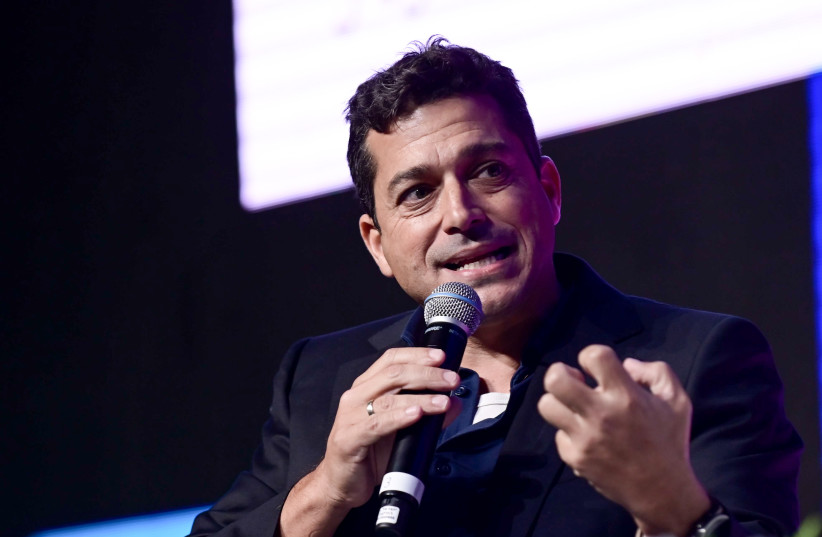Israel's Diaspora Ministry gets biggest ever budget: NIS 500m.

Minister Amichai Chikli vowed to look for solution to the Jewish school crisis, such as the high tuition in US Jewish schools.
The Diaspora Affairs and Combating Antisemitism Ministry obtained a budget with an increase of 50% to NIS 500 million for the next two years.
According to its minister Amichai Chikli, he succeeded in obtaining the largest budget the ministry ever had since it was established. In addition, the minister revealed that he and his team are looking for solutions to the tuition crisis in American Jewish schools and the educational crisis of Jewish schools worldwide, regarding Jewish education and Hebrew studies.
He also said that in his view, if a community is small and there is a lot of antisemitism, those Jewish communities should make aliyah to Israel.
Chikli revealed this data during an interview with The Jerusalem Post on Tuesday during the Global Coalition for Israel (GC4I) conference in Jerusalem, initiated by the Foreign Ministry, the National Information Service and the Diaspora Affairs and Combating Antisemitism Ministry. The conference hosted more than 100 civil society leaders from different countries, as well as about 100 heads of organizations from Israel.
Chikli responded to a question from the audience, of a Danish Jew who shared the difficulties of a small community with a huge proportion of elderly members and not as many youngsters. The minister said that “when you look at Jewish communities in Scandinavia,” you “can learn what the price of antisemitism is.” He quoted a member of the Swedish Jewish community who shared with him that many Jews left the country since they “were afraid to go to Jewish institutions and synagogues.” He said that “Jewish communities actually disappeared; stopped functioning.”
“This is not a game. It’s not winning a debate on campus. This is a war. A true war,” the minister said about antisemitism outside of Israel. As for small communities such as Denmark, “I think that from a strategic perspective, the best thing to do is to try and bring them [these Jews] to Israeli soil, if they [would] want to.
“We’re not forcing anyone to come to Israel, but with such a tiny community, it might be better to come here, if we want them to have their grandchildren continuing with Jewish life,” he said, yet emphasizing that it’s a decision for the community to make. “We can only assist. This is your decision.”
Amichai Chikli's big surprise: The large and powerful Israeli community in the US
CHIKLI SPOKE about his role as minister in the past two months. He shared that the “most surprising thing [he encountered] was the Israeli community overseas,” he said of his participation in the Israeli American Council event in Austin, Texas. “I knew the liberal streams before; I had no idea of how powerful and big the Israeli community is in the US.”
He was also surprised by the Jewish communities in South America. “I didn’t understand the vibrant, dynamic and positive aspects of the Jewish communities in Latin America. They are just amazing, and they have their own unique style. They’re more happy and extremely Zionist.”
He spoke of the short- and long-term work of the ministry. Chikli explained that there are specific issues in small Jewish communities suffering from antisemitism that need immediate assistance. He also mentioned the shooting of Jews in Los Angeles outside of synagogues and the support he tried to give the community as a result.
He explained that the “biggest mission” of the ministry is to “have strong Jewish communities abroad,” elaborating that he is talking about the investment in Jewish education, which will lead towards “strong Jewish communities,” which “are an asset,” for the Jewish world and “for the State of Israel.”
“The main effort, [in order] to have strong Jewish communities, is to empower education with successful [educational] initiatives,” he said, repeating his theory that he sees the Diaspora Affairs Ministry as “a venture capital.”
“We are looking for the most relevant players, the most dynamic, energetic players on the ground and we want to empower them; we cannot replace them. We don’t know the challenges of the Jewish community in Chile better than they know them. They know better than us. We don’t know the challenges of the Jewish community in Houston, Texas – they know better than us.”
He said he was shocked when he learned the amount that American Jews need to pay for Jewish education. “It’s just insane the amount of money that a family needs to invest to give [their children] Jewish education. It’s like taking another mortgage. This is actually a tragedy. And... we don’t have an answer for this challenge tomorrow morning. But we are learning every successful model that [exists].”
He said the idea is to “try and help the schools have a better strategic plan for how to make the school larger,” or making the Judaic studies teachers “more proud. They shouldn’t need to work in many other jobs to stay on their feet. We’re working with many foundations to try and solve [this situation].” Chikli said that he hopes that in a month or two, the ministry will make “operational decisions,” on the matter.
Jerusalem Post Store
`; document.getElementById("linkPremium").innerHTML = cont; var divWithLink = document.getElementById("premium-link"); if (divWithLink !== null && divWithLink !== 'undefined') { divWithLink.style.border = "solid 1px #cb0f3e"; divWithLink.style.textAlign = "center"; divWithLink.style.marginBottom = "15px"; divWithLink.style.marginTop = "15px"; divWithLink.style.width = "100%"; divWithLink.style.backgroundColor = "#122952"; divWithLink.style.color = "#ffffff"; divWithLink.style.lineHeight = "1.5"; } } (function (v, i) { });

